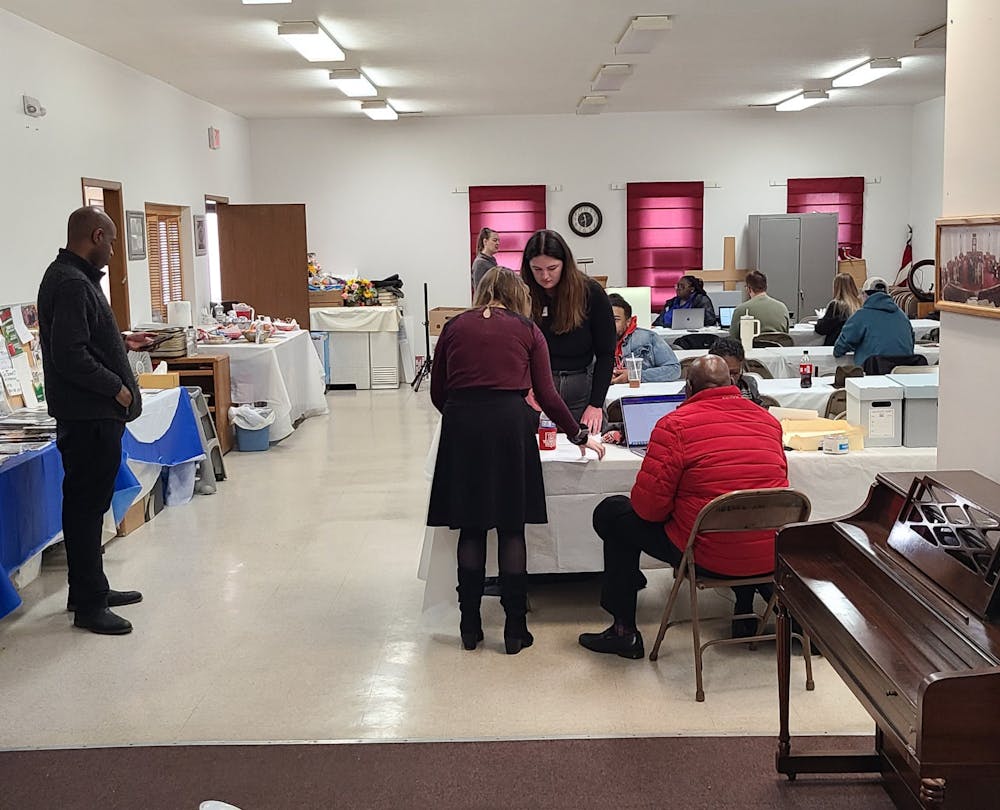On Feb. 24, the Bethel African Methodist Episcopal (AME) Church was not set up for regular services. The main chapel was organized to conduct interviews and a secondary space with the ability to digitize documents. The individuals inside were not there for church but rather a data collection event.
Jazma Sutton, an assistant professor of history at Miami University, hosted a Black History Harvest in conjunction with Bethel African Methodist Episcopal (AME) Church in Uptown Oxford. Bethel AME is the oldest Black church in Oxford and now has a mixed congregation.
A history harvest is when a university partners with a local community to preserve artifacts. In this case, Miami University Libraries and Sutton’s Black Midwestern History class partnered with Bethel AME to preserve local artifacts of Oxford’s African American community.
Sutton originally planned the history harvest after she struggled to find written records of African American women of the Midwest in traditional archives. In response, she started focusing on digital humanities work.
The event was organized with the help of Rev. Terrence Cato and Rev. Alice Cato, who are the pastors of the Bethel AME Church. They originally met Sutton during homecoming and offered to help after she told them about her plans for a history harvest.
“This is not a Black thing. This is an Oxford thing,” Alice Cato said. “It's just focused on the Black history in Oxford and everyone has history in Oxford.”
The Catos later advertised the event to the congregation and reached out to local community members inviting them to participate.
The event consisted of two rooms; the main chapel where interviews were conducted to digitize the oral history from local community members and a room where Sutton’s students digitized documents ranging from photos to newspaper clippings.
The event went beyond the documentation of Oxford’s Black history. Community members met and conversed with each other about the artifacts being preserved and found connections between shared pasts.
Deloris Coles, a class of 1964 Miami alumni and a member of Bethel AME’s congregation, brought in photos and newspaper clippings of her husband Charlie Coles, a former basketball coach for Miami. She resided in Oxford, where her father owned a car wash, until she graduated from Miami and later returned when her husband was hired by the university.
Coles was interviewed by Sutton’s students and described her experience growing up in Oxford as a Black woman in the 1950s and 1960s.
Growing up in the 1950s, Coles experienced de facto segregation in Oxford. She described her experiences, which included being forced to sit on the balcony on fold-up chairs in the local movie theater.
Enjoy what you're reading?
Signup for our newsletter
Coles also described her experiences in the local Talawanda school district. While the schools were integrated, students tended to self-segregate.
“They didn't know anything [about] Black people … just what they heard,” Coles said, “You didn't say hi as you were walking down the hall like you do these days.”
De’Yon Brown, a senior sports management and educational psychology major, recorded the oral history that Coles told during the event.
“She does have an impact on me, knowing that there's so much more to delve into about African Americans [in] Oxford,” Brown said.
He originally took Sutton’s course to learn more about Black history, which he feels is often overlooked by the traditional education system.
Tyayia Young, a graduate student in creative writing, cataloged material for the archive. She photographed community artifacts ranging from photos of family members and alumni gatherings to bowling plaques and magnets.
“I feel like I've [taken] some good pictures and just had conversations with people and to hear the other conversations going on around me,” Young said. “It was nice. Even if people don't find out about this event, the people here have been able to share their history back and forth with one another.”




